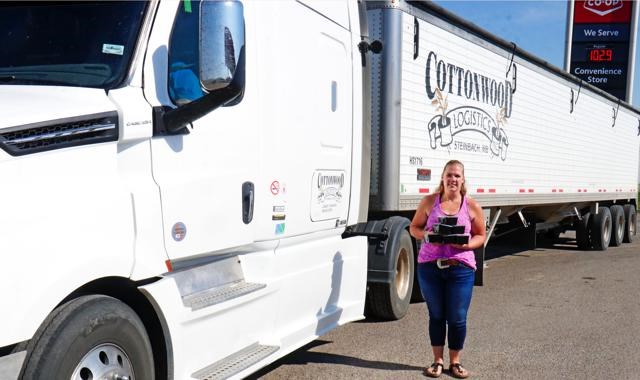Weyburn resident Melissa Carson was surprised and shocked when she found out she was to receive $5,000 from Conexus Credit Union from their Kindness Capital Fund, in recognition of her project to feed truckers during the lockdown imposed during the COVID-19 pandemic this past spring.
Conexus Credit Union launched the Kindness Capital Fund to give financial support to continue acts of kindness people have shown across Saskatchewan during COVID-19. Administration revenue earned from the Canada Emergency Business Account (CEBA) federal loan program is being used to re-invest into Saskatchewan through the creation of the Conexus Kindness Capital Fund.
Carson began her project once the lockdowns began around March 20, which was also when school classes were shut down and a state of emergency was declared for the province of Saskatchewan. She was affected as she was a caretaker at the Weyburn Comprehensive School, and had a week off before she returned to work.
Her parents are truckers, and told her of the situation where truck drivers were declared as essential workers, yet truck stops and restaurants had to close down, leaving them with no way to get any food while driving their routes to deliver the goods that were needed.
She started making meals for her parents to take with them on the road, and then had the idea of going to Weyburn’s main truck stop, the Co-op Crossroads location, and offered home-made hot meals to the truckers who stopped there.
Carson said this surprised many of the truckers, even moving some to tears, and most of them offered her a donation to offset the costs of the meal.
“Most truckers said they don’t want free meals, they just wanted food that’s not something out of a box but something that was homemade,” she said, noting she suggested a $5 donation if they asked. If they didn’t ask or offer to provide a donation, she didn’t ask for one, and noted the vast majority of the truckers did give her a donation for the food.
While the demand has petered out now, she provided meals to truckers 57 days in a row, making just under 1,000 meals so far.
Mostly she made casseroles, such as baked lasagna or mac and cheese, spaghetti, beef stew, or ham and scalloped potatoes. She began to get repeat drivers, and they learned to request their favourites if they knew they would be passing through Weyburn.
As word got out about what she was doing, people provided monetary donations to help her out, plus she got a donation of snack items which she added in with the meals. These included apple sauce, granola bars and crispers.
“I had truckers who hadn’t had a hot meal in four weeks,” she said. “They were surprised, and you could just see the joy in their faces.”
Asked if truckers made requests for a meal, she said, “If I knew they were coming in, they would often request their favourite meal.”
“I appreciate truckers. Even before COVID, they were essential. When you grow up with parents who are truckers, you appreciate what they do. I grew up in a truck. Every holiday, I’d go on trips with my dad — I loved it,” said Carson.
While most places are more or less back to normal service, she will still get a call once in a while from one of her repeat truckers. She noted she had a request recently for an order of 20 frozen meals. She also still makes meals for her parents while they’re home from a long haul before they head out on the road again.
As far as the Conexus award, she had no idea she had been nominated until she got a phone call informing her, and shortly after was told she was one of 40 recipients of the award.
“It was totally unexpected,” said Carson. “I never wanted recognition for this, but it was nice to get recognized for it.”
Other than the one week off, she remained working full-time from 7 a.m. to 3 p.m. every day, so her meal preparation and deliveries all took place after work and on the weekends.




